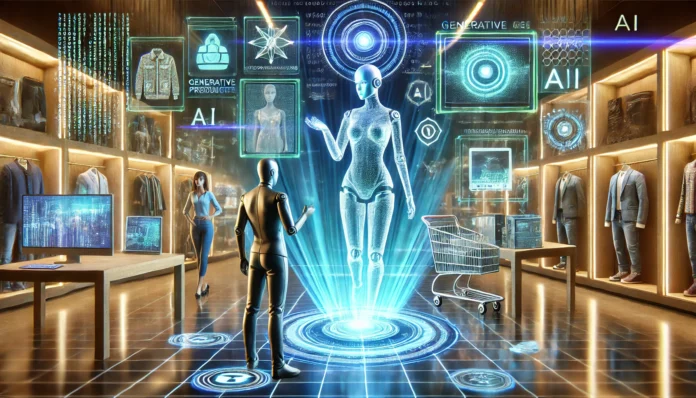In the fast-evolving world of e-commerce, generative AI is emerging as a game-changer, transforming how businesses interact with customers and deliver personalized shopping experiences. By leveraging advanced algorithms, generative AI creates unique, tailored content and solutions that redefine convenience, engagement, and efficiency in the digital marketplace. As consumer expectations for personalization soar, this technology is reshaping the landscape of online shopping in unprecedented ways.
What is Generative AI in E-Commerce?
Generative AI refers to AI systems capable of creating new content, such as product descriptions, personalized recommendations, or even marketing campaigns, by analyzing and synthesizing existing data. Using techniques like natural language processing (NLP) and machine learning, these systems can generate dynamic, customer-centric outputs that enhance the shopping experience.
Applications of Generative AI in E-Commerce
1. Personalized Recommendations
Generative AI analyzes browsing history, purchase patterns, and preferences to provide highly personalized product suggestions.
- Example: Amazon and Netflix use AI to recommend items and content based on individual behavior, increasing user engagement and sales.
2. Dynamic Content Creation
AI generates customized product descriptions, email campaigns, and advertisements tailored to specific audiences.
- Example: Tools like Jasper and Copy.ai help e-commerce businesses create compelling, SEO-friendly content at scale.
3. Virtual Try-Ons and Customization
Generative AI powers virtual fitting rooms and product customization tools, allowing customers to visualize products before purchasing.
- Example: Sephora’s AI-driven virtual makeup try-on feature enhances customer confidence and satisfaction.
4. Chatbots and Virtual Assistants
AI chatbots handle customer inquiries, provide shopping assistance, and even suggest products based on user inputs.
- Example: Platforms like ChatGPT are integrated into e-commerce sites to offer 24/7 support and personalized guidance.
5. Inventory and Pricing Optimization
Generative AI predicts demand patterns and optimizes inventory and pricing strategies, ensuring products are available when and where customers need them.
Benefits of Generative AI in E-Commerce
1. Enhanced Customer Experience
AI delivers hyper-personalized interactions, making shopping more intuitive and enjoyable.
2. Increased Efficiency
Automating content creation, customer support, and inventory management saves time and reduces operational costs.
3. Improved Conversion Rates
Tailored recommendations and dynamic content engage customers, increasing the likelihood of purchases.
4. Scalability
Generative AI enables businesses to expand their offerings and reach larger audiences without significant increases in labor or resources.
Challenges and Ethical Considerations
1. Data Privacy Concerns
Personalization relies on collecting and analyzing customer data, raising concerns about privacy and data security.
2. Dependence on AI Accuracy
Errors in AI-generated content or recommendations can harm the customer experience and damage brand trust.
3. Potential for Bias
AI systems may inadvertently perpetuate biases in recommendations or pricing, leading to unfair practices.
4. Job Displacement
The automation of tasks traditionally performed by humans may lead to workforce reductions, necessitating reskilling initiatives.
Generative AI Trends in E-Commerce
1. AI-Powered Marketplaces
Marketplaces like Etsy and Alibaba are exploring AI to connect buyers with niche products through intelligent search and recommendation algorithms.
2. Voice Commerce Integration
Generative AI is driving voice-activated shopping experiences through virtual assistants like Amazon Alexa and Google Assistant.
3. Sustainability Insights
AI helps businesses provide sustainability-focused recommendations, aligning with growing consumer demand for eco-friendly practices.
4. Augmented Reality (AR) and AI
The combination of AR and generative AI enables immersive shopping experiences, such as virtually furnishing a room with selected items.
The Future of Generative AI in E-Commerce
As generative AI continues to evolve, its potential to revolutionize e-commerce is limitless. Future advancements may include:
- Emotion-Aware AI: Systems capable of understanding and responding to customer emotions, creating even deeper personalization.
- Real-Time Customization: AI that adapts marketing content, product displays, and pricing dynamically based on user interactions.
- Seamless Omnichannel Experiences: AI will integrate online and offline shopping, providing a unified experience across all platforms.
Conclusion
Generative AI is redefining the e-commerce experience by combining innovation with customer-centric solutions. Its ability to personalize, optimize, and scale operations makes it indispensable for businesses looking to stay competitive in a rapidly changing digital economy. However, as with any transformative technology, ethical considerations and data security must remain at the forefront. By embracing generative AI thoughtfully, e-commerce can unlock a future of unparalleled growth and customer satisfaction.





